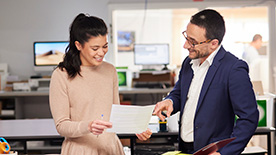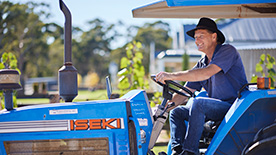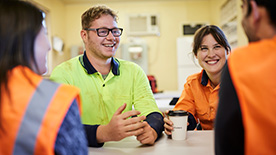Return to work coordinator profile - Rebekah Eley
 Having only undertaken her Return to Work Coordinator training in August, Rebekah and the Human Resources team at Farquhar Group (incorporating KT3) have wasted no time in implementing some key changes around how workers are supported following injury. Being responsible for return to work across many sites, and with over 200 employees, meant that Rebekah couldn’t be everywhere at once. Rebekah and the team have worked hard to ensure that all workers have quick access to treatment and a great support network immediately following injury, and in May, KT3 invited Houda Peters, ReturnToWorkSA Employer Education Advisor to visit the Lonsdale plant, and deliver education to KT3 Leaders and Managers to better equip them to support their injured workers, from onset of injury, to return to work.
Having only undertaken her Return to Work Coordinator training in August, Rebekah and the Human Resources team at Farquhar Group (incorporating KT3) have wasted no time in implementing some key changes around how workers are supported following injury. Being responsible for return to work across many sites, and with over 200 employees, meant that Rebekah couldn’t be everywhere at once. Rebekah and the team have worked hard to ensure that all workers have quick access to treatment and a great support network immediately following injury, and in May, KT3 invited Houda Peters, ReturnToWorkSA Employer Education Advisor to visit the Lonsdale plant, and deliver education to KT3 Leaders and Managers to better equip them to support their injured workers, from onset of injury, to return to work.![]()
Name: Rebekah Eley
Position: HR/Payroll Officer
Organisation: KT3 Kitchens is a family owned and operated kitchen manufacturing company based in Lonsdale. KT3 is part of the Farquhar Group of Companies. We employ over 100 people in our factory, where we manufacture cabinets and laminate benchtops, PVC and laminate doors to the trade throughout Australia. As part of the Farquhar Group we also offer a full design service with Farquhar Kitchens or a do it yourself style kitchen with our U-Install-It kitchen range.
Being a relatively new Return to Work Coordinator, can you tell us about your experience in the role to date, from your training in February to now?
Having no previous experience being a Return to Work Coordinator I wasn’t sure what to expect from this role. It can be quite daunting having to assist an injured worker with their return to work program whilst trying to understand any frustrations that they are dealing with regarding pain, modified duties, etc.
What do you see as being some of your greatest challenges, and what are some of the initiatives that you have implemented to improve recovery and return to work within your workplace?
One of the greatest challenges I faced was the complexity of some of our roles and trying to work with the doctors and physios on how to accommodate modified duties. To improve this we have recently partnered with Randstad who now do all of our pre-employment medicals as well as on-site work assessments for any injured workers. This has been a great asset to our RTW program as Randstad now have a great understanding of our business as well as various roles across our different teams. This helps significantly with modified duties and returning the employee to their pre-injury duties.
Another service we have implemented is Industrial Medic Services (IMS) which is a 24/7 Occupational Injury Response and Management Service. We can call them out to site at any time for their Paramedics to assess and treat any non-life threatening injuries. If a hospital visit or General Practitioner review is required, they will transfer the employee to hospital and return them back to site following their treatment. This service gives us early intervention and assessment on site, transport of our employees for a range of medical services and priority access to a 24/7 private hospital with physicians, diagnostic imaging, pharmacy and all the specialists and doctors who are associated with this hospital.
You recently invited Houda Peters, Employer Education Advisor to come out and deliver some education with your management team – can you tell us what prompted this, and the impact that it has had on how return to work is managed?
Houda gave a presentation during my RTW training where she explained her role with ReturnToWorkSA and how she can assist RTW Coordinators and businesses with further training and education. One improvement we wanted to make to our current RTW procedure was to have the leaders and managers involved from the start and to be supportive of the injured employee. Houda met with Kylie (HR Manager) and myself prior to this training to discuss what would help our leaders become more involved and comfortable with dealing with an injured employee. We ran two 1.5 hour sessions which gave the leaders a greater understanding of the changes to RTW, what they can do to assist the worker and how to help the RTW Coordinator in their role. The feedback from all that attended was extremely positive and they now have a better understanding of what to do when someone injures themselves at work.
You’ve already made some significant strides in the return to work space since your training in February, but what’s next for the Return to Work Coordinator role, and KT3/Farquhar Group?
We will be continually reviewing and improving the processes that we have recently implemented. One area we want to focus on next is mental health in the workplace. We plan to run some information sessions for both leaders and managers to help raise the awareness of mental health and help reduce the stigma that surrounds it through I Am Worthmore. We will also be launching a Mental Health Training Platform through Tap into Safety, which will give us an insight into the Mental Health of our workers. From there we can build our wellbeing program around the needs of our workforce.
What advice would you give to new Return to Work Coordinators, who may have only recently completed their training, and don’t know where to start? (or are feeling overwhelmed)
Utilise all the free training and seminars that ReturnToWorkSA offer. Engage with supervisors and managers in your workforce as they are a huge help when dealing with a workplace injury.
To see what’s coming up, visit www.rtwsa.com/events.
Thank you for your time Rebekah!






 Date printed: 23 Jul 2024
Date printed: 23 Jul 2024

